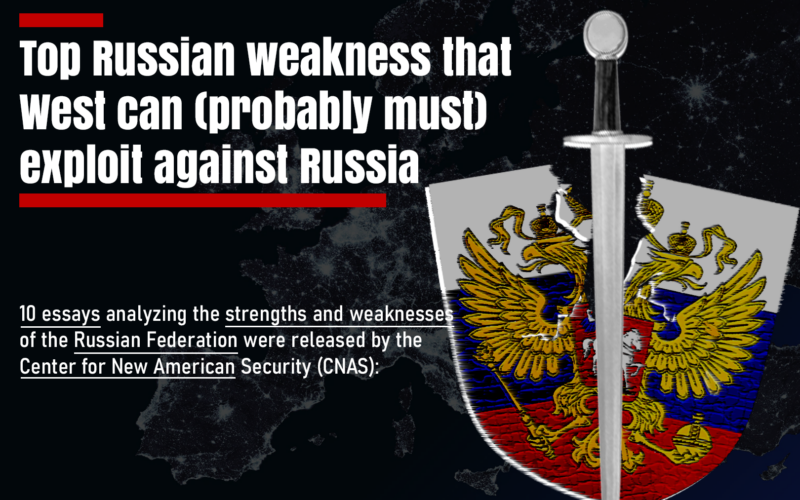10 essays analyzing the strengths and weaknesses of the Russian Federation were released by the Center for New American Security (CNAS): «Identifying Russian Vulnerabilities and How to Leverage Them” . The mission of the Transatlantic Security Program is to strengthen transatlantic relations and help decisionmakers understand, anticipate, and respond to challenges in Europe and Russia.
Getting U.S. policy toward Russia right requires an understanding of Russia’s vulnerabilities and how to leverage them. The architect of containment, George F. Kennan, recognized the Soviet Union’s weaknesses and internal contradictions—vulnerabilities he argued would ultimately undo the Communist regime. The same is true today. The highly personalized, authoritarian regime President Vladimir Putin has constructed over the past 23 years is beset with vulnerabilities that, if subjected to steady and forceful pressure, could give way to new political leadership more amenable to constructive relations with the United States and its allies.
Leveraging these vulnerabilities could help the United States and its allies complicate Russia’s ability to sustain the war in Ukraine and aggression beyond its borders more broadly, and grow the coalition of countries willing and able to oppose such aggression.
The highly personalized, authoritarian regime Putin has constructed over the past 23 years is beset with vulnerabilities that, if subjected to steady and forceful pressure, could give way to new political leadership more amenable to constructive relations with the United States and its allies.
Introduction
Russia will emerge from the war in Ukraine politically, economically, and militarily weaker than before its invasion of the neighboring country. Ukrainian forces will significantly weaken the Russian army, while Western sanctions restrict the Russian economy. NATO is expanding, and Russian influence is diminishing in regions historically under Kremlin’s political sway, such as Central Asia. However, while Russia will be weakened, Moscow will adapt to these growing challenges. For instance, Russia is finding ways to bypass the sanctions and export controls imposed by the United States and Europe, mitigating their impact. Despite Europe’s historical rejection of Russian oil and gas and the significant impact of the upper limit of oil prices on Russian government revenues, Moscow has increased sales to other countries such as China and India. Russia may be weakened by the war in Ukraine, but it remains a long-term challenge – a sufficiently powerful state capable of influencing global politics and threatening U.S. interests.
Addressing this issue will require the United States and Europe to continue current efforts aimed at limiting and containing the Kremlin’s ability to sustain aggression in Ukraine and, more broadly, beyond Russian borders. This will also necessitate a long-term and sustained approach to reducing the influence of the tools and tactics that Moscow relies heavily upon, which, given the degradation of its conventional armed forces in Ukraine, are likely to largely involve unconventional methods such as disinformation, sabotage, and cyberattacks, including on critical infrastructure. Therefore, strategies to counter contemporary Russia should resemble the containment strategy first laid out in the 1940s, designed to provide a constant and strong counterbalance to a regime whose paranoia and insecurity posed an obvious danger to the West, much as Putin’s regime does today.
U.S. efforts to exploit Russia’s vulnerabilities should not aim to organize a regime change – this is for the Russians to decide. However, the United States and its allies should maximize Russia’s vulnerabilities to help create conditions more favorable for reformers inside Russia working towards a more liberal and less hostile nation. The United States and its allies should not shy away from actions that support such political changes, out of fear of what comes after Putin. Political changes in Russia carry risks – violence, chaos, and internal conflict – but they also offer the opportunity for a more promising future for Russia and its relations with neighbors and the West.
Specifically, Western efforts to exploit Russia’s vulnerabilities are necessary to prevent Russia from continuing its aggressive war in Ukraine. Similarly, U.S. policy should aim to undermine Russia’s ability to sustain aggression beyond its borders, whether by weakening its military potential or by creating numerous challenges that the Kremlin will have to face, consuming its capacity to support its malicious activities. Additionally, efforts targeting Russia’s vulnerabilities can help the U.S. expand the coalition of countries willing and able to resist Russian aggression, including by weakening Russian influence over its longtime partners.
Russia’s invasion of Ukraine has clearly exposed many of its vulnerabilities. For example, the flawed planning and poor performance of the Russian army in Ukraine demonstrated the vulnerability that comes with the personalization of power. Putin’s decision to surround himself with obedient and loyal people led to serious miscalculations not only in his decision to invade Ukraine but also in his understanding of how the war would unfold, and in the subsequent flawed planning. Similarly, the failed coup attempt against the leader of “Wagner” Yevgeny Prigozhin in June 2023 revealed a vulnerability created by the Kremlin itself, overly relying on a private military company. By allowing an alternative center of power with access to weapons to develop, Putin initiated the most serious challenge to his rule since taking office in 2000. While the Kremlin may have neutralized the immediate threat, including through the likely killing of Prigozhin, this whole episode exposed weaknesses that could catch up with the regime over time.
This series of essays identifies 10 of the most vulnerable points of contemporary Russia in defense, economy, diplomacy, and politics. Some of these vulnerabilities, such as Russia’s dependence on oil and gas exports or the emigration of many of its brightest and most talented citizens, have existed for a long time but have been exacerbated by Russia’s invasion of Ukraine. Other vulnerabilities discussed in the essays have been created by the war, such as Ukraine’s ability to impose future costs on Russia or the challenges Russian diplomats face in international organizations.
Russia has many vulnerabilities that did not make it into this series, such as the “Wagner” example we discussed earlier, or its bleak demographic prospects. These are key weaknesses of the Russian state and its government, but there are few realistic opportunities for the United States and Europe to exploit these vulnerabilities.




